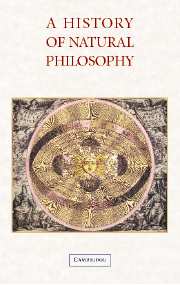Book contents
- Frontmatter
- Contents
- Preface
- 1 Ancient Egypt to Plato
- 2 Aristotle (384–322 BC)
- 3 Late Antiquity
- 4 Islam and the Eastward Shift of Aristotelian Natural Philosophy
- 5 Natural Philosophy before the Latin Translations
- 6 Translations in the Twelfth and Thirteenth Centuries
- 7 Natural Philosophy after the Translations: Its Role and Place in the Late Middle Ages
- 8 The Form and Content of Late Medieval Natural Philosophy
- 9 The Relations between Natural Philosophy and Theology
- 10 The Transformation of Medieval Natural Philosophy from the Early Modern Period to the End of the Nineteenth Century
- Conclusion
- Bibliography
- Index
1 - Ancient Egypt to Plato
Published online by Cambridge University Press: 05 June 2012
- Frontmatter
- Contents
- Preface
- 1 Ancient Egypt to Plato
- 2 Aristotle (384–322 BC)
- 3 Late Antiquity
- 4 Islam and the Eastward Shift of Aristotelian Natural Philosophy
- 5 Natural Philosophy before the Latin Translations
- 6 Translations in the Twelfth and Thirteenth Centuries
- 7 Natural Philosophy after the Translations: Its Role and Place in the Late Middle Ages
- 8 The Form and Content of Late Medieval Natural Philosophy
- 9 The Relations between Natural Philosophy and Theology
- 10 The Transformation of Medieval Natural Philosophy from the Early Modern Period to the End of the Nineteenth Century
- Conclusion
- Bibliography
- Index
Summary
THE PRELITERATE BEGINNINGS
Natural philosophy began with no name to designate it, and in its embryonic phase it included just about anything relevant to nature. Until the time of Aristotle, who shaped the discipline of natural philosophy for the following two thousand years, the study of nature may be said to have embraced all inquiries and questions about the physical world. On what is such a claim based? Surely it is not based on anything said or recorded. But we may reasonably interpret the earliest form of natural philosophy as embracing “all inquiries about the physical world” because we have no reason not to do so. Natural philosophy may be said to have begun with the first efforts to understand the world by the earliest human beings in their fight for survival. Thus, it extends to preliterate societies, which, for thousands of years, amassed knowledge about the world, which they passed on to subsequent generations.
Members of preliterate societies learned by empirical methods about the habits of this or that animal, or this or that plant, or devised explanations, either magical or natural, about this or that individual natural phenomenon. They must have gleaned knowledge about nature from hunting and from the earliest kinds of agriculture in which they engaged. “But to have the idea of the nature of some particular object is not to have the general conception of a domain of nature encompassing all natural phenomena.”
- Type
- Chapter
- Information
- A History of Natural PhilosophyFrom the Ancient World to the Nineteenth Century, pp. 1 - 26Publisher: Cambridge University PressPrint publication year: 2007



